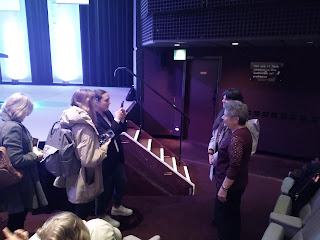 |
| Image by Fulton County Sheriff's Office, State of Georgia via Wikipedia [Fair Use] |
It's time for... News Quiz 2023! Following the annual tradition since the start of this blog, here comes the news quiz some of you have been waiting for.
 |
| Image by Fulton County Sheriff's Office, State of Georgia via Wikipedia [Fair Use] |
Penny Ur shares research she finds interesting at IATEFL 2023
 |
| Penny Ur posting for photos with fans after her IATEFL talk (19.4.23) |
This is the second instalment of my two-part post about Penny Ur’s session at IATEFL matter-of-factly entitled Interesting recent research, in which, in a span of 30 minutes, I learned more than during the rest of the conference.
Click HERE for the first part.
The reason why it’s taken me so long to publish this (IATEFL took place in April) is that it’s not merely a summary of the talk. Upon my return I did some digging into the sources Penny Ur cited; the result is a summary combined with some personal reflections. By her own admission, she whizzed through so many studies in the talk that I only focus on those that are interesting to me.
A lesson based on Janine di Giovanni's TED talk
 |
| Image source: TED.com [Fair use] |
 |
| Photos of the Week section in The Atlantic |
 One of my students showed her vocabulary (and grammar) notebook to her private tutor, who was surprised at the way new vocabulary was recorded in it. The student then conveyed the tutor's concerns to me, for example, that "pack in" doesn't have to go necessarily with the job (I'd taught the group "she's packed in her job"). She said, "it means 'finish' or 'give up'". I agreed. But where does it get you? If "pack in" can be substituted for "finish" or one of the other alleged synonyms (alleged because no two or more words are ever absolute synonyms - see HERE), can we say "I've packed in my homework"?
One of my students showed her vocabulary (and grammar) notebook to her private tutor, who was surprised at the way new vocabulary was recorded in it. The student then conveyed the tutor's concerns to me, for example, that "pack in" doesn't have to go necessarily with the job (I'd taught the group "she's packed in her job"). She said, "it means 'finish' or 'give up'". I agreed. But where does it get you? If "pack in" can be substituted for "finish" or one of the other alleged synonyms (alleged because no two or more words are ever absolute synonyms - see HERE), can we say "I've packed in my homework"? The third person singular of the Present Simple tense is known to be particularly problematic for learners and when the "Be Like Bill" meme took social media by storm last week, I thought that it presents a wonderful opportunity to practise the problematic structure.
The third person singular of the Present Simple tense is known to be particularly problematic for learners and when the "Be Like Bill" meme took social media by storm last week, I thought that it presents a wonderful opportunity to practise the problematic structure. |
Photo by Dustpuppy72 via Flickr
[CC BY-NC-ND 2.0]
|
 10 things you didn't know last week is a digest of news snippets published every Friday on the BBC website. You can find it in a section called Magazine Monitor. The items chosen for inclusion tend be offbeat and quirky news - very often to do with science. Each story is linked to its source - on the BBC website or elsewhere on the web.
10 things you didn't know last week is a digest of news snippets published every Friday on the BBC website. You can find it in a section called Magazine Monitor. The items chosen for inclusion tend be offbeat and quirky news - very often to do with science. Each story is linked to its source - on the BBC website or elsewhere on the web. |
| Image by Peter Megyeri on Flickr (CC BY 2.0) |
 |
 |
| By lasanta.com.ec via Flickr [CC BY 2.0] |
 |
| Image source: www.universalstudiosentertainment.com |
 |
| Image source: www.willis-elt.co.uk |
 |
By @eannegrenoble | eltpics on Flickr
|
 |
| Photo by richardoyork on Flickr [CC BY-NC-ND 2.0] |